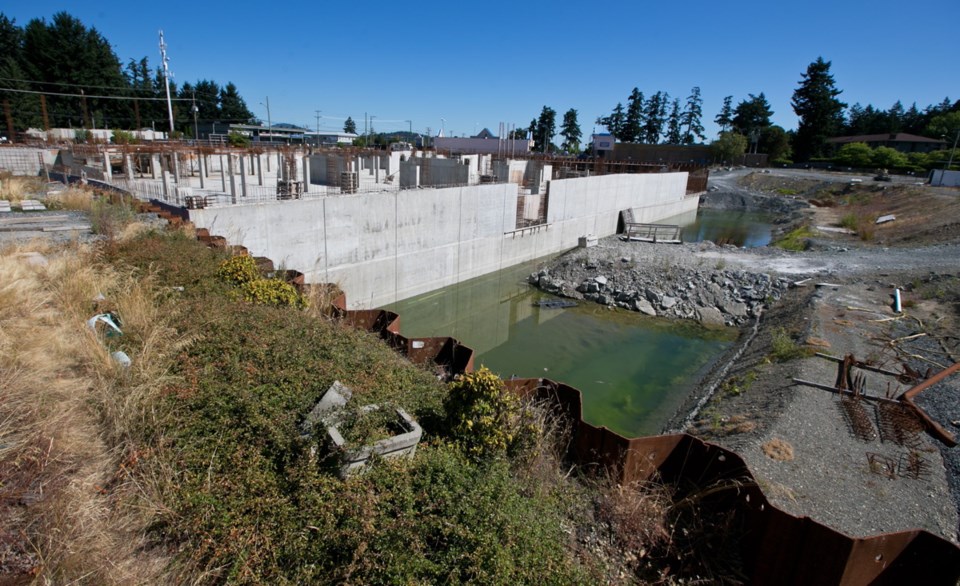Ownership of the Colwood property that was to become Capital City Centre has been transferred to a Vancouver developer for $17.5 million.
Under a deal approved by B.C. Supreme Court, Onni Group will take control of the League Assets subsidiary that was behind Capital City Centre. The site at Colwood
Corners now consists of a large hole in the ground with concrete foundation work.
It’s unclear what Onni intends to do with the property once it takes possession, but the firm is in the business of building and owning residential and commercial space.
In the past 10 years, Onni has built 6,000 homes. It owns and manages about five million square feet of commercial space and 4,600 apartments.
The $17.5 million provided by Onni will be used to pay off secured creditors and property taxes before this weekend. The limited partnership behind Capital City Centre will be restructured to give Onni control.
The move, another in a series of transactions designed to liquidate all properties owned by League Assets under a court-approved restructuring, will mean the limited partnership created to develop Capital City Centre will go into bankruptcy.
At one point, the project had a $1.2-billion budget and plans for offices, stores and housing.
The sale to Onni comes in the nick of time for some stakeholders. Capital City Centre had been handed back to secured creditors for sale earlier this year.
PricewaterhouseCoopers, the firm overseeing League’s restructuring, said those creditors had agreed to sell the project to Anthem Properties for $13.2 million. That deal was to close this week. However, both League and its monitor believed a better deal could be had if League’s ownership could be restructured and simplified. A buyer would incur less expense and spend less time to make an offer.
The result of a simpler structure was five new offers, the best coming from Onni.
The Onni money will pay off about $700,000 in property taxes and secured lenders owed about $14 million. It appears unsecured creditors owed $122 million — $100 million of which is a loan to another League entity — and equity investors will get nothing.
That’s nothing new for investors, who have already been told they will get only pennies from League’s restructuring and eventual demise.
About 4,200 investors pumped $369 million into investments offered by League companies and have been told they will get back no more than 10 per cent of their money.
A report released earlier this year by Mike Vermette of PricewaterhouseCoopers said investors would receive an estimated $37 million and that League would liquidate all assets and virtually cease to exist by the end of the first quarter of 2015.
That $37 million is to be split between those who hold secured investor notes, those with unsecured investor notes and those who have equity investments.
Those holding secured notes will split $19 million, a 63 per cent recovery of their investment. Those with unsecured investor notes will split $3.7 million, a nine per cent recovery, and those with equity investments in League will split $14 million, a 90 per cent recovery. There is nothing for others owed $279 million worth of equity investments.
League, which started in 2005 with the idea of pooling funds to invest in the kinds of commercial real estate normally available only to institutional investors, at one point had six offices across Canada, employed 135 people, held 170 legal entities and had $418 million in assets. It also had $233 million in liabilities, owed $369 million to investors and had serious cash-flow problems.
In his report, Vermette said League’s ideas died as a result of the Capital City Centre project, which halted construction in the spring of 2013 due to insufficient funds.
aduffy@timescolonist.com



